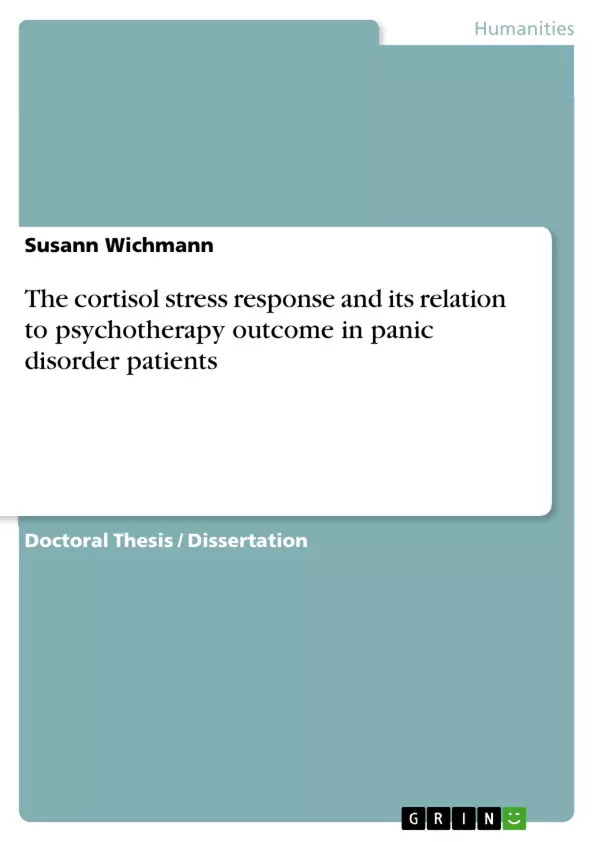Although effective treatment is available for panic disorder (PD), a proportion of patients experience an incomplete remission and relapses after the first-line psychotherapeutic treatment. To date, previous research has been unable to identify reliable therapy
outcome predictors of a psychological or disorder-related kind. Initial attempts to understand the aetiology and treatment of PD put an emphasis on biological models, failed however to examine potential biological predictors for therapy success.
Further, for understanding the biological correlates of PD, previous reports focused extensively on the distinction of the
hypothalamic-pituitary-adrenal-(HPA) axis-mediated cortisol stress response when comparing patient samples and healthy populations, with little emphasis on a direct comparison of patient groups. In comparison with healthy individuals, cortisol hypo-responsiveness is a relatively consistent finding in panic-centric research. Thus, the current thesis is aimed at improving the
existing knowledge about the cortisol stress response in PD patients with and without agoraphobia in relation to other psychiatric disorders as well as in reference to the psychotherapy success.
Inhaltsverzeichnis (Table of Contents)
- 0 Summary
- 1 Introduction
- 1.1 Panic disorder: definitions and aetiology
- 1.2 Treatment options for panic disorder and therapy success
- 1.3 Cortisol stress response in panic disorder patients compared to healthy individuals as well as post-traumatic stress disorder and major depressive disorder patients
- 2 Aims
- 3 Methods
- 4 Study I: Effects of the cortisol stress response on the psychotherapy outcome for panic disorder patients
- 4.1 Abstract
- 4.2 Introduction
- 4.3 Methods
- 4.4 Results
- 4.5 Discussion
- 5 Study II: Cortisol stress response in post-traumatic stress disorder, panic disorder and major depressive disorder patients
- 5.1 Abstract
- 5.2 Introduction
- 5.3 Methods
- 5.4 Results
- 5.5 Discussion
- 6 Study III: Stress hormone response to the DEX-CRH test and its relation to psychotherapy outcome in panic disorder patients with and without agoraphobia
- 6.1 Abstract
- 6.2 Introduction
- 6.3 Methods
- 6.4 Results
- 6.5 Discussion
- 7 Discussion
- 7.1 Discussion of main findings
- 7.2 Implications for clinical practice
- 7.3 Implications for future research
- 7.4 Strengths and limitations
- 8 Conclusions
- 9 References
Zielsetzung und Themenschwerpunkte (Objectives and Key Themes)
This dissertation investigates the relationship between the cortisol stress response and psychotherapy outcome in panic disorder patients. The study aims to explore the potential role of the cortisol stress response in predicting treatment success and to provide insights into the underlying mechanisms of panic disorder.- The cortisol stress response in panic disorder patients
- The relationship between cortisol stress response and psychotherapy outcome
- Factors influencing the cortisol stress response in panic disorder
- Implications for clinical practice and future research
Zusammenfassung der Kapitel (Chapter Summaries)
The introduction provides a comprehensive overview of panic disorder, including its definition, aetiology, and treatment options. It also discusses the existing literature on the cortisol stress response in panic disorder patients compared to healthy individuals, as well as patients with post-traumatic stress disorder and major depressive disorder. Study I investigates the effects of the cortisol stress response on the psychotherapy outcome for panic disorder patients. The study examines the relationship between baseline cortisol levels, cortisol stress response, and therapy success in a sample of panic disorder patients. Study II examines the cortisol stress response in patients with post-traumatic stress disorder, panic disorder, and major depressive disorder. The study explores differences in cortisol stress response patterns across these diagnostic groups. Study III focuses on the stress hormone response to the DEX-CRH test and its relation to psychotherapy outcome in panic disorder patients with and without agoraphobia. The study investigates the role of the DEX-CRH test in predicting treatment response in panic disorder. The discussion chapter synthesizes the main findings of the dissertation, highlighting the implications for clinical practice and future research. It also discusses the strengths and limitations of the study.Schlüsselwörter (Keywords)
The primary keywords of this dissertation include panic disorder, cortisol stress response, psychotherapy outcome, DEX-CRH test, agoraphobia, post-traumatic stress disorder, and major depressive disorder. The research focuses on the role of the cortisol stress response in predicting treatment success and understanding the underlying mechanisms of panic disorder.Frequently Asked Questions
Can cortisol levels predict the success of psychotherapy for panic disorder?
The dissertation investigates whether the cortisol stress response can serve as a biological predictor for therapy outcome in patients with panic disorder, as psychological predictors are often unreliable.
What is "cortisol hypo-responsiveness" in panic disorder?
Research consistently shows that patients with panic disorder often exhibit a lower cortisol response to stress compared to healthy individuals, a phenomenon known as hypo-responsiveness.
What is the DEX-CRH test mentioned in the study?
The DEX-CRH test is a combined dexamethasone-suppression/corticotropin-releasing hormone test used to evaluate the regulation of the hypothalamic-pituitary-adrenal (HPA) axis in psychiatric patients.
How does panic disorder compare to depression regarding stress response?
The thesis compares cortisol stress response patterns across different diagnostic groups, including panic disorder, major depressive disorder (MDD), and post-traumatic stress disorder (PTSD).
Does agoraphobia influence the cortisol stress response?
Study III specifically focuses on panic disorder patients both with and without agoraphobia to see if the presence of agoraphobia alters the hormonal response and therapy success.
- Citar trabajo
- Susann Wichmann (Autor), 2018, The cortisol stress response and its relation to psychotherapy outcome in panic disorder patients, Múnich, GRIN Verlag, https://www.grin.com/document/489362



